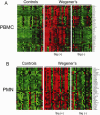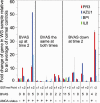Transcription of proteinase 3 and related myelopoiesis genes in peripheral blood mononuclear cells of patients with active Wegener's granulomatosis
- PMID: 20155833
- PMCID: PMC2887718
- DOI: 10.1002/art.27398
Transcription of proteinase 3 and related myelopoiesis genes in peripheral blood mononuclear cells of patients with active Wegener's granulomatosis
Abstract
Objective: Wegener's granulomatosis (WG) is a systemic inflammatory disease that is associated with substantial morbidity. The aim of this study was to understand the biology underlying WG and to discover markers of disease activity that would be useful for prognosis and treatment guidance.
Methods: Gene expression profiling was performed using total RNA from peripheral blood mononuclear cells (PBMCs) and granulocyte fractions from 41 patients with WG and 23 healthy control subjects. Gene set enrichment analysis (GSEA) was performed to search for candidate WG-associated molecular pathways and disease activity biomarkers. Principal components analysis was used to visualize relationships between subgroups of WG patients and controls. Longitudinal changes in proteinase 3 (PR3) gene expression were evaluated using reverse transcription-polymerase chain reaction, and clinical outcomes, including remission status and disease activity, were determined using the Birmingham Vasculitis Activity Score for WG (BVAS-WG).
Results: Eighty-six genes in WG PBMCs and 40 in WG polymorphonuclear neutrophils (PMNs) were significantly up-regulated relative to controls. Genes up-regulated in WG PBMCs were involved in myeloid differentiation, and these included the WG autoantigen PR3. The coordinated regulation of myeloid differentiation genes was confirmed by GSEA. The median expression values of the 86 up-regulated genes in WG PBMCs were associated with disease activity (P = 1.3 x 10(-4)), and WG patients with low-level expression of the WG signature genes showed expression profiles that were only modestly different from that in healthy controls (P = 0.07). PR3 transcription was significantly up-regulated in WG PBMCs (P = 1.3 x 10(-5), false discovery rate [FDR] 0.002), but not in WG PMNs (P = 0.03, FDR 0.28), and a preliminary longitudinal analysis showed that the fold change in PR3 RNA levels in WG PBMCs corresponded to changes in the BVAS-WG score over time.
Conclusion: Transcription of PR3 and related myeloid differentiation genes in PBMCs may represent novel markers of disease activity in WG.
Figures




Similar articles
-
Leucocyte membrane expression of proteinase 3 correlates with disease activity in patients with Wegener's granulomatosis.Br J Rheumatol. 1998 Aug;37(8):901-7. doi: 10.1093/rheumatology/37.8.901. Br J Rheumatol. 1998. PMID: 9734683
-
Complexes between proteinase 3, alpha 1-antitrypsin and proteinase 3 anti-neutrophil cytoplasm autoantibodies: a comparison between alpha 1-antitrypsin PiZ allele carriers and non-carriers with Wegener's granulomatosis.Eur J Clin Invest. 1996 Sep;26(9):786-92. doi: 10.1046/j.1365-2362.1996.2070553.x. Eur J Clin Invest. 1996. PMID: 8889441
-
Proteinase 3 gene polymorphisms and Wegener's granulomatosis.Kidney Int. 2000 Dec;58(6):2473-7. doi: 10.1046/j.1523-1755.2000.00430.x. Kidney Int. 2000. PMID: 11115080
-
'Classic' anti-neutrophil cytoplasmic autoantibodies (cANCA), 'Wegener's autoantigen' and their immunopathogenic role in Wegener's granulomatosis.J Autoimmun. 1993 Apr;6(2):171-84. doi: 10.1006/jaut.1993.1015. J Autoimmun. 1993. PMID: 8388690 Review.
-
Proteinase 3, protease-activated receptor-2 and interleukin-32: linking innate and autoimmunity in Wegener's granulomatosis.Clin Exp Rheumatol. 2008 May-Jun;26(3 Suppl 49):S112-7. Clin Exp Rheumatol. 2008. PMID: 18799068 Review.
Cited by
-
Histone modification signature at myeloperoxidase and proteinase 3 in patients with anti-neutrophil cytoplasmic autoantibody-associated vasculitis.Clin Epigenetics. 2016 Aug 12;8:85. doi: 10.1186/s13148-016-0251-0. eCollection 2016. Clin Epigenetics. 2016. PMID: 27752292 Free PMC article.
-
Granuloma in ANCA-associated vasculitides: another reason to distinguish between syndromes?Curr Rheumatol Rep. 2013 Nov;15(11):376. doi: 10.1007/s11926-013-0376-5. Curr Rheumatol Rep. 2013. PMID: 24078103 Review.
-
Ranking metrics in gene set enrichment analysis: do they matter?BMC Bioinformatics. 2017 May 12;18(1):256. doi: 10.1186/s12859-017-1674-0. BMC Bioinformatics. 2017. PMID: 28499413 Free PMC article.
-
Neutrophil-Related Gene Expression and Low-Density Granulocytes Associated With Disease Activity and Response to Treatment in Antineutrophil Cytoplasmic Antibody-Associated Vasculitis.Arthritis Rheumatol. 2015 Jul;67(7):1922-32. doi: 10.1002/art.39153. Arthritis Rheumatol. 2015. PMID: 25891759 Free PMC article.
-
A myelopoiesis gene signature during remission in anti-neutrophil cytoplasm antibody-associated vasculitis does not predict relapses but seems to reflect ongoing prednisolone therapy.Clin Exp Immunol. 2014 Feb;175(2):215-26. doi: 10.1111/cei.12236. Clin Exp Immunol. 2014. PMID: 24215168 Free PMC article.
References
-
- Seo P, Min YI, Holbrook JT, Hoffman GS, Merkel PA, Spiera R, et al. Damage caused by Wegener's granulomatosis and its treatment: prospective data from the Wegener's Granulomatosis Etanercept Trial (WGET). Arthritis Rheum. 2005 Jul;52(7):2168–78. - PubMed
-
- Seo P. Wegener's granulomatosis: managing more than inflammation. Curr Opin Rheumatol. 2008 Jan;20(1):10–6. - PubMed
-
- Merkel PA, Seo P, Aries P, Neogi T, Villa-Forte A, Boers M, et al. Current status of outcome measures in vasculitis: focus on Wegener's granulomatosis and microscopic polyangiitis. Report from OMERACT 7. J Rheumatol. 2005 Dec;32(12):2488–95. - PubMed
-
- van der Woude FJ, Rasmussen N, Lobatto S, Wiik A, Permin H, van Es LA, et al. Autoantibodies against neutrophils and monocytes: tool for diagnosis and marker of disease activity in Wegener's granulomatosis. Lancet. 1985 Feb 23;1(0140-6736; 8426):425–9. - PubMed
-
- Gupta SK, Niles JL, McCluskey RT, Arnaout MA. Identity of Wegener's autoantigen (p29) with proteinase 3 and myeloblastin. Blood. 1990 Nov 15;76(0006-4971; 10):2162. - PubMed
Publication types
MeSH terms
Substances
Grants and funding
LinkOut - more resources
Full Text Sources
Medical
Molecular Biology Databases

